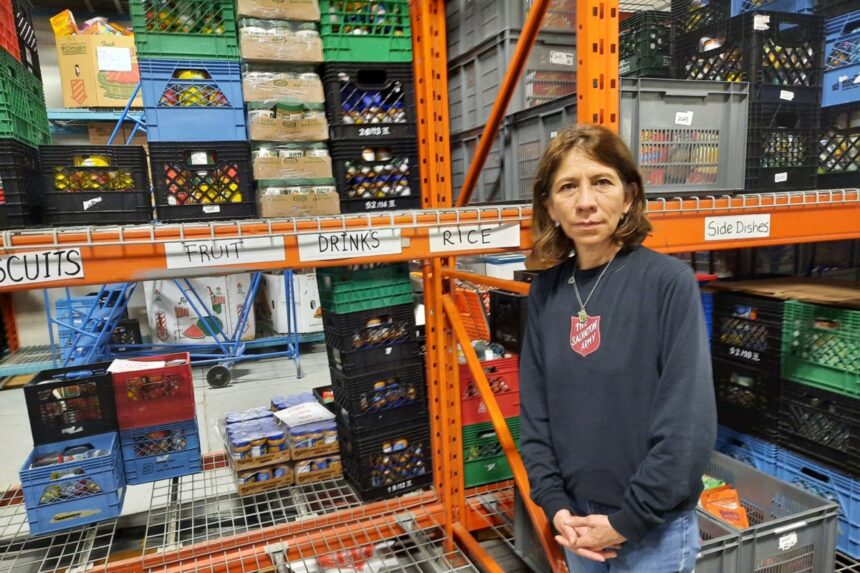The lifeline is fraying at the edges. That’s what Milton Community Resource Centre staff tell me as I walk through their food bank operation on a Tuesday morning. What should be rows of well-stocked shelves look increasingly sparse, with gaps where pasta sauce, canned proteins, and other staples once stood in abundance.
“We’re seeing unprecedented need,” explains Donna Danielli, Executive Director of the Milton Food Bank. Her voice carries the weight of someone watching a safety net strain under pressure. “Our client numbers have increased by nearly 40% compared to this time last year, but donations haven’t kept pace.”
The food bank, which serves over 700 families monthly in this rapidly growing community west of Toronto, is facing what staff describe as a “perfect storm” of economic pressures. Inflation, housing costs, and stagnant wages have pushed many working families to seek assistance for the first time.
Sara Martinez, a single mother of two who works full-time in retail, represents this new demographic of food bank users. “I never thought I’d need this help,” she tells me, her eyes fixed on the shopping cart she’s filling carefully. “After rent and utilities, there’s almost nothing left for food. I’m working more hours than ever, but it’s still not enough.”
The Milton Community Resource Centre reports that approximately 30% of their current clients are employed—many holding multiple jobs—yet still struggle to make ends meet. This marks a significant shift from historical patterns where unemployment was the primary driver of food bank usage.
Data from Food Banks Canada shows this isn’t just a Milton problem. Their 2023 HungerCount report documented a 32% increase in food bank visits nationwide compared to pre-pandemic levels, with Ontario seeing some of the steepest climbs.
The shelves at Milton’s food bank tell the story visually. Where once there were four varieties of pasta, now there are two. The protein section—typically stocked with tuna, beans, and peanut butter—is particularly depleted. Volunteers point to empty spaces where baby formula and diapers usually sit.
“People see the economy improving in macro terms, but that’s not translating to relief for families living paycheck to paycheck,” says economist Armine Yalnizyan, who studies labor market trends. “Food inflation may have eased somewhat, but it came after prices had already jumped significantly. Many households haven’t recovered.”
Local businesses have historically been reliable supporters of the food bank, but they too face challenges in the current economic climate. Several longtime corporate donors have reduced their contributions, citing their own financial constraints.
Milton councillor Kristina Tesser Derksen has witnessed the struggle firsthand during volunteer shifts. “The community has always stepped up when needed, and we’re calling on that spirit again,” she says. “This isn’t just about emergency food—it’s about maintaining dignity for our neighbors during tough times.”
The food bank has launched an urgent spring replenishment campaign, hoping to address critical shortages before summer—traditionally a period when donations decrease while need remains high. They’re particularly requesting items high in protein, including canned fish, beans, and peanut butter, along with pasta sauce, rice, and baby formula.
What makes this situation particularly concerning is the demographic shift. Milton, once primarily a bedroom community for Toronto commuters, has seen significant population growth and diversification. Many newcomers arrived with professional qualifications but face barriers to employment in their fields.
“We’re seeing engineers, healthcare workers, and educators who are underemployed while waiting for credential recognition,” explains volunteer coordinator Jaspreet Singh. “They’re working whatever jobs they can find, but it’s often not enough to cover basic necessities in today’s economy.”
The impact extends beyond adults. School nutrition programs report increasing numbers of children arriving hungry, and teachers note concentration difficulties among students from food-insecure households. Research consistently shows that childhood hunger can have lasting effects on educational outcomes and development.
Milton’s experience reflects broader provincial trends. Feed Ontario’s most recent Hunger Report indicates that food bank usage across the province reached the highest levels in history last year, with nearly 800,000 Ontarians accessing emergency food support.
Community response has begun to mobilize. Local faith groups have organized collection drives, and several schools have launched friendly competition food drives. The Milton Chamber of Commerce is encouraging member businesses to coordinate departmental collections.
Mayor Gord Krantz, known for his hands-on approach to community issues, issued a statement urging residents to consider monthly donations rather than one-time contributions. “Consistent support allows for better planning and ensures help is available year-round, not just during high-profile donation periods,” the statement noted.
For those who use the service, the food bank represents more than just groceries—it’s a community safety net that preserves dignity during difficult times. Many clients eventually become donors once their situations improve, completing a circle of community care.
“We used the food bank for eight months after my husband’s workplace injury,” shares former client Teresa Oliveira. “Now that we’re back on our feet, we donate monthly. It’s about paying it forward.”
As I finish my visit, volunteers are preparing for the afternoon distribution session. They carefully arrange the remaining inventory to make the most of what’s available. Their dedication is evident, but so is their concern about meeting the growing need.
The empty shelves at Milton’s food bank tell a story that extends far beyond this community—one of increasing vulnerability despite economic recovery statistics. For now, they’re hoping their neighbors will help restock those shelves before they’re forced to reduce distributions, a step nobody wants to see become necessary.






